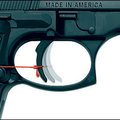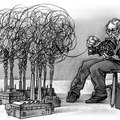But the short walk-out is over
| |
 | |
THE streets near General Motors’ Cadillac assembly plant on the east side of Detroit are usually quiet. But for a couple of days that was replaced with commotion as a line of workers, buoyed by coffee and mounting frustration, paced back and forth at the factory gates. On Monday September 24th, for the first time in over 30 years, the United Auto Workers union (UAW) launched a nationwide strike against one of America’s big carmakers. Union leaders promise the strike would endure “for as long as it takes.” That proved to be two days—the strike was called off in the early hours of Wednesday morning after the two sides hammered out a deal on a new contract.
The union’s old contract with GM officially expired on September 14th, but steady progress persuaded the UAW to agree to an extension. But after ten days, the UAW’s president, Ron Gettelfinger, apparently felt that a strike was the only way to break a deadlock over his top priority: job security.
Many observers thought that these tough talks could be resolved without confrontation. But making GM competitive again was always likely to mean radical changes to industry contracts. And the deal between GM and the UAW will act as a template for similar agreements with Ford and Chrysler.
Not that long ago, negotiations simply served as a means for the car industry’s unions and bosses to carve up an ever-expanding pie. But over the past 25 years, the situation has changed dramatically with the emergence of rivals, particularly from Asia. In July, for the first time ever, foreign brands captured more than half the new-vehicle market and few see the trend reversing.
Millions of foreign-badged vehicles pour off assembly lines in America. Nissan, Honda and Toyota produce well over half the vehicles they sell in North America in situ. Wages at these mainly non-union plants are far lower than for Detroit's “Big Three”. There are many reasons for the gap, including costly pension schemes for massive numbers of retired workers. But nothing is more troubling than health care. Over time UAW has hammered out a system of coverage for both current and retired workers that, by some estimates, adds up to $2,000 to the cost of every vehicle that Detroit produces.
Though details of the new contract were not revealed it seems that GM has come up with a solution, or at least a partial fix, in the form of a Voluntary Employee Beneficiary Association—essentially a trust fund to pay for the health-care benefits of retired workers. GM’s will shift obligations of about $50 billion off its books by letting the UAW take control of the programme.
But the strike was more about job security than health care. Since America’s carmakers came under serious assault from abroad in the late 1970s, the union’s workforce has shrunk from 1.5m to a little over half a million today. Additional cuts are already planned as part of a previous restructuring deal. Still more seem certain as Detroit’s carmakers attempt to outsource production to cheaper destinations abroad. By one estimate, the labour gap between GM and Toyota swallows up enough cash to pay for four new-model programmes each year for the American firm. And spending to develop cars that Americans want to buy is vital if GM is to reverse its decline.
GM is now offering some guarantees on job security. According to reports it has promised big investment in American plants to produce new models. In return the UAW has agreed to a significant cut back of the notorious “jobs bank”, which guarantees full pay to unemployed workers for years, and lower pay for new hires, among other measures.
Neither side had much to gain from a prolonged strike. It could have cost GM about $1 billion a week in operating profits and in two months the carmaker would have faced bankruptcy. And then 73,000 workers would lose their jobs, precisely what the UAW does not want. In the end the workers got to flex their muscles in the balmy autumn air and GM has made a welcome step towards closing the gap between American car companies and their rivals.



